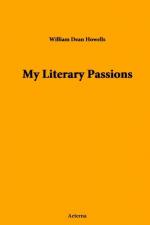I loved my Chaucer too well, I hope, not to get some good from the best in him; and my reading of criticism had taught me how and where to look for the best, and to know it when I had found it. Of course I began to copy him. That is, I did not attempt anything like his tales in kind; they must have seemed too hopelessly far away in taste and time, but I studied his verse, and imitated a stanza which I found in some of his things and had not found elsewhere; I rejoiced in the freshness and sweetness of his diction, and though I felt that his structure was obsolete, there was in his wording something homelier and heartier than the imported analogues that had taken the place of the phrases he used.
I began to employ in my own work the archaic words that I fancied most, which was futile and foolish enough, and I formed a preference for the simpler Anglo-Saxon woof of our speech, which was not so bad. Of course, being left so much as I was to my own whim in such things, I could not keep a just mean; I had an aversion for the Latin derivatives which was nothing short of a craze. Some half-bred critic whom I had read made me believe that English could be written without them, and had better be written so, and I did not escape from this lamentable error until I had produced with weariness and vexation of spirit several pieces of prose wholly composed of monosyllables. I suspect now that I did not always stop to consider whether my short words were not as Latin by race as any of the long words I rejected, and that I only made sure they were short.
The frivolous ingenuity which wasted itself in this exercise happily could not hold out long, and in verse it was pretty well helpless from the beginning. Yet I will not altogether blame it, for it made me know, as nothing else could, the resources of our tongue in that sort; and in the revolt from the slavish bondage I took upon myself I did not go so far as to plunge into any very wild polysyllabic excesses. I still like the little word if it says the thing I want to say as well as the big one, but I honor above all the word that says the thing. At the same time I confess that I have a prejudice against certain words that I cannot overcome; the sight of some offends me, the sound of others, and rather than use one of those detested vocables, even when I perceive that it would convey my exact meaning, I would cast about long for some other. I think this is a foible, and a disadvantage, but I do not deny it.




